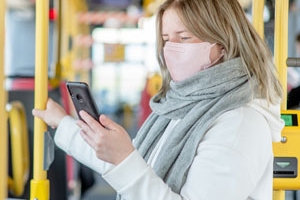What policies can NH use to open back up?

It will take scientists a year or more to develop a vaccine for the new coronavirus. Until then, officials are concerned an outbreak could overwhelm the New Hampshire healthcare system.
A “stay at home” order is an effective but blunt instrument to stop the spread of COVID-19. The government could take a lighter touch if it was able to rapidly identify and isolate anyone infected.
Here are the programs other states and countries are evaluating to control coronavirus without keeping everyone at home.
1. Widespread testing
Right now testing in New Hampshire is limited due to a range of factors, including a shortage of personal protective equipment for the people administering tests. Policymakers are working overtime to fix these deficiencies. Once testing is widely available, a negative coronavirus test might become a requirement to engage in some activities, such as flying.
Even in the absence of coronavirus tests, temperature checks, symptom surveys, and smell tests are being used to screen employees at locations in New Hampshire and around the world. (A loss of smell is one possible symptom of COVID-19.)
The UK is looking into so-called “immunity passports” for people who test positive for antibodies that can fight coronavirus. Those people would be allowed to return to work without any social distancing limits. One downside to this plan: people might try to purposely get infected to gain immunity. It’s also not yet clear how long immunity lasts.
Looking at Gov. Sununu’s response to the coronavirus so far, a voluntary request for people to participate in testing, or limited testing requirements based on circumstances, seem more likely than a widespread government mandate that everyone get tested. Employers may ultimately choose to require coronavirus tests among employees, similar to how some employers require vaccines or drug tests.
Any policies requiring a test would have to consider who is responsible for paying: individuals, employers, insurers, or the government.
2. Develop an army of public health workers
Once you identify sick people through testing, public health experts also recommend identifying everyone who had contact with the person. These contacts should be monitored for symptoms, tested, and/or isolated. These efforts are called “contact tracing.”
In Wuhan, China, the center of the coronavirus outbreak, the government deployed 1,800 five-person teams to track down everyone who had contact with an infected person.
Right now public health officials in New Hampshire simply don’t have enough staff to complete contact tracing.
Massachusetts may offer a glimpse of what’s ahead for the Granite State in this regard. Last week Gov. Charlie Baker announced a plan to hire and train roughly 1,000 people to work on contact tracing in the Bay State.
Some public health experts want the government to hire a nationwide army of contact tracers. Ideally this would help curb the spread of disease while also creating many employment opportunities.
Opponents may be leery of hiring thousands of employees, on the taxpayer’s dime, to track people’s movements.
3. Deploy a tracing app
Several countries are experimenting with using smartphone technology to track people’s movements and speed up contact tracing.
In China, users get a red, yellow, or green code on a phone app. Red means the user is infected or waiting on test results. Yellow means the user’s cell phone was close to a person with a red code within the past fourteen days. Green means there are no known risks to the user. Users must show their phone codes to travel and enter various locations. Red and yellow users are supposed to stay at home.
The app raises serious privacy concerns. People are also targeted for harassment based on their color code.
Meanwhile developers in Europe and the United States are working on apps that similarly track close contact between cell phone users but keep that data encrypted and anonymous.
The Pan-European Privacy-Preserving Proximity Tracing project, or PEPP-PT, was unveiled last week as an app with anonymity, encryption, and other safeguards. For example, a user must input a code from a health care provider to indicate infection. This prevents “trolls” from tricking people into thinking they came in contact with a sick person.
Given legal history in New Hampshire, it’s unlikely the government would require everyone to install a smartphone app. Article 2-b of the New Hampshire bill of rights states “An individual's right to live free from governmental intrusion in private or personal information is natural, essential, and inherent.”
If the government encouraged everyone to voluntarily install the app, a large share of smartphone users would need to opt-in to make the app effective.
4. Enter a social distancing cycle
A March 2020 paper from the Imperial College COVID-19 Response Team suggests that society enter a social distancing cycle. Every time ICU admissions start to spike, everyone returns to sheltering in place. When cases fall back down, the economy reopens.
This solution does not require any scientific or technological advancements, so it could be implemented immediately. Unfortunately, it introduces a lot of uncertainty for schools, businesses, and families.
According to Gov. Sununu, the worst days of coronavirus are still ahead for New Hampshire, but there is some evidence that social distancing is slowing down infections. Assuming these trends continue, some of these policies could get debated later this spring.











Comments
Login or register to post comments